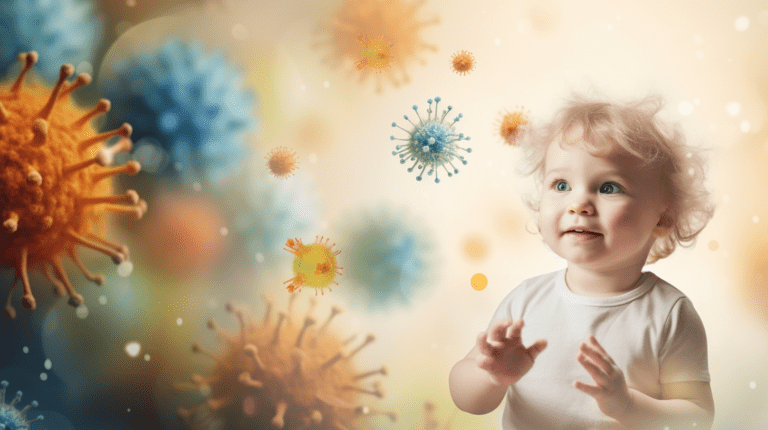A dive into the how the earliest stages of life impact long-term health, and the surprising influence of our tiniest residents – microbes!
Key Takeaways:
- The infant microbiome plays a crucial role in shaping not just gut health, but also brain development, immune function, and disease risk
- Environmental exposures like delivery method, feeding practices, and antibiotic use can substantially alter the microbiome, thereby impacting health outcomes
- Groundbreaking research is paving the way for targeted microbiota-based therapies and policy changes, including FDA guidelines on arsenic levels in infant foods
Picture your gut as a bustling city, where microorganisms are the citizens, contributing to the city’s economy, infrastructure, and health. Now envision this on a miniaturized scale inside an infant. That’s right – our tiniest humans are buzzing with microbial activity that sets the stage for their lifelong health.
Why the Microbiome Matters
In a recent webinar hosted by Science AAAS, Dr. Juliette Madan took us through the labyrinth of the infant microbiome and how it plays such a big role in long-term health. It’s not just about digestion; the microbiome influences everything from brain development to immune system maturation. Think of it as our microscopic task force, working around the clock to fend off obesity, allergies, asthma, and even autoimmune diseases.
It Starts Early, Really Early
Of particular interest was the finding that delivery mode plays a crucial role in shaping infant microbial diversity. The research presented revealed that the vaginal versus surgical delivery had the most profound impact on the early-life microbiome. Interestingly, breast-feeding could help restore the microbiome of surgically delivered infants to resemble those delivered vaginally.
The Gut-Brain Connection
The microbiome’s influence doesn’t stop in the gut. This webinar showcased studies revealing that infant microbial diversity correlates with neurodevelopmental outcomes. Elevated levels of specific bacterial taxa, such as Ruminococcus sp., were linked to autism-related behaviors. Moreover, lower overall microbial diversity correlated with an array of mental health issues, including anxiety, ADHD, and depression.
Therapeutic Interventions and Policy Impact
Current research is transitioning into actionable therapies like fecal transplants and microbial-mediated treatments. But the change isn’t limited to the lab. Policy-wise, research from Dr. Juliette Madan has already influenced FDA guidelines on arsenic in infant food and led New Hampshire to set groundbreaking limits on PFAS chemicals in drinking water. Science, meet real-world impact!
Conclusion
If you’re in biosciences or a recent grad exploring the biotech landscape, take note. Understanding the microbiome isn’t just about mapping a new frontier in human biology; it’s the future of healthcare. Teams of researchers, clinicians, and policymakers are joining forces to harness the microbiome’s potential, offering a cornucopia of job opportunities and career paths.
Whether you’re fascinated by gut bacteria or intrigued by how early life sets the stage for long-term health, the microbiome is where you’ll want to be. Check out these relevant job postings at Greatness.bio and help build the future, one cell at a time.
The link to the webinar can be found here.
Speaker: Dr. Juliette Madan
Associate Professor of Pediatrics, Psychiatry, Epidemiology, and Quantitative Biomedical Data Sciences at the Giesel School of Medicine at Dartmouth College
Dr. Madan is an expert in the developing microbiome in large infant cohorts examining the relationship between environmental exposures, the microbiome, and health outcomes. Dr. Madan’s lab is now focused on the relationship between the gut microbiome and neurodevelopmental and neuropsychiatric outcomes and interventions such as nutritional or probiotic regimens and

